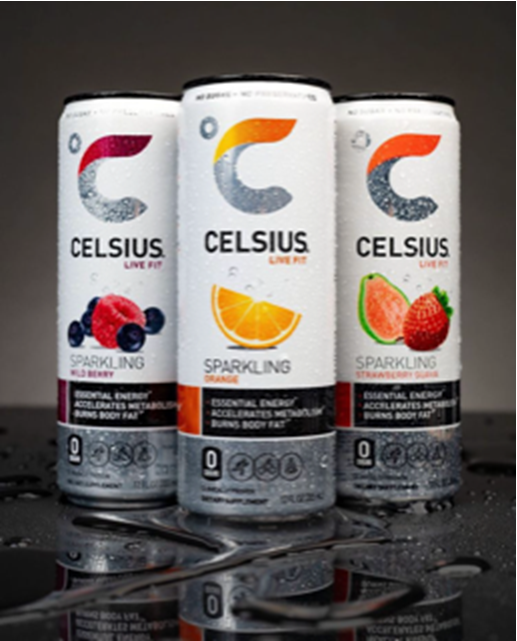The Rise — and Potential Dangers — of Celsius
The rising popularity of Celsius, a caffeine-packed energy drink, has swept the Williston campus and led to conversations about the health benefits of the controversial beverage.
Celsius is marketed to increase the consumer’s metabolism and help those who consume it to “live fit.” Despite this, one 12-ounce can of Celsius contains 200 mg of caffeine, half of the maximum daily amount recommended by the FDA.
Originally released in 2005 by Celsius Holdings Inc., the beverage has gained popularity over the last few years. While the drink is advertised as promoting health benefits, many community members are becoming aware of the negative qualities of the drink: the caffeine concentration, artificial sweeteners, and high acidity, to name a few.
Local stores such as 7-Eleven have started carrying Celsius, making it more readily available to Williston students. One 12-once can costs approximately $2; the accessibility and cost has led to Celsius’ increasing presence around campus.
According to Macrotrends, the net worth of Celsius Holdings Inc. hit an all-time high on Nov. 1, 2021, with a value of $8.6 billion. This is staggering compared to Nov. 2, 2020, when the company’s net worth was $1.67 billion.
Natalie Stott, a senior boarding student from Franklin, Mass., is a fan of the drink and feels it helps her prepare for athletic contests.
“I really like Celsius because I just think that they taste good, and I also don’t drink coffee, so I feel like it’s a good way to have a source of caffeine,” Natalie said. “I just started drinking it before games and it’s just kind of a tradition now.”
Caroline Aufiero, a sophomore boarding student from Belmont, Mass., started drinking Celsius for athletic benefits.
“My mom bought me one and [told me to] try it and then she really liked how I played after my hockey game, and she was like, ‘you have to drink these before every game now,’” she said.
Emma Merrill, a senior boarder from Portland, Maine, started drinking Celsius as an alternative to other sugary drinks.
Emma said her consumption of the drink has changed.
“I went through a phase where I drank one like every single morning, but now, I’m trying to do it every other day,” she said.
Natalie and Caroline acknowledged that they typically only drink Celsius before games now.
On the other hand, there are members of our community who do not support Celsius. Alex Tancrell-Fontaine, an English teacher and Girls’ Varsity Hockey and Field Hockey assistant coach, feels the drink has a negative impact.
“I am not a fan of when athletes on my teams drink Celsius,” Tancrell-Fontaine remarked. “There’s a noticeable difference in their behaviors. I have even seen students be unable to sit and just stand in place bouncing. I think the amount of caffeine in them leads to high highs and then large crashes
in energy. There also seems to be an obsession with making sure to have a Celsius on a game day.”
Lindsay Hanford, a registered nurse and one of the Health and Wellness staff at Williston agreed that Celsius has negative effects.
“It is concerning because too much caffeine can cause people to become addicted and requiring more to get the same effect,” Hanford said. “It can also cause side effects such as increase heart rate or irregular heartbeat, insomnia, and anxiety. It is not recommended for people under 18.”
The Celsius website corroborates this statement. It reads: “CELSIUS is not recommended for people sensitive to caffeine, children under the age of 18, or women who are pregnant or nursing.”
Natalie recognized that drinking Celsius has become almost a trend for athletes.
“I think Celsius has definitely caught on,” she said. “At the beginning of the year, I didn’t see a ton of people drinking it, and then I feel like it almost started as sort of a trend where everyone had to have one before a game or a practice.”
Tancrell-Fontaine agrees that the drink’s popularity for the drink has grown, and she thinks a lot is due to successful advertising.
“I know they are sold more widely now. I also think this has a lot to do with social media and the way they are marketed. They are popular on TikTok, and I have seen Celsius trying to target the high school, college-age demographic,” she said.
There also seems to be a discrepancy between the girls’ and boys’ athletic teams when it comes to drinking Celsius before games.
Members of the Girls’ Varsity Hockey, Field Hockey, Soccer, Volleyball, and Basketball teams all attested to seeing a recent rise in the popularity of drinking Celsius before games. On the other hand, members of the Boys’ Varsity Football, Hockey, Squash, Basketball, Water Polo, and Swim teams said they have not seen their teammates take a particular liking to the drink. Additionally, members of the Dance team and Theater department report that they have not seen members of their teams drinking Celsius before big events.
Nurse Hanford does not endorse Celsius, but has a recommendation for anyone set on drinking the beverage.
“If you are going to drink it consider only having 1 / day and not anytime near bedtime,” she said. “Too many students are already sleep deprived and have anxiety; this will only exacerbate those issues.”













Jennifer Sullivan • Apr 19, 2023 at 9:33 PM
Can Celsius Drink actually be helping my skin pain (nerve pain)? I was recently diagnosed with peripheral neuropathy by my neurologist. (Not diabetic related) I’ve had skin pain for over 20 years. But, it had gotten progressively worse. So, I finally saw a neurologist and he said it is not “nerve pain”. But, to be honest…. It really just feels like my skin is on raging fire. So, my skin hurts (up to level 10 at times) all over my body! It is similar to Shingles Pain… but no rash…. just pain…. And all over my skin. But, recently I bought Celsius drink powder to add to my water. And, I couldn’t help notice that when I drink it, it stops my skin from hurting. Could this just be a coincidence? I was prescribed gabapentin for the nerve pain, which definitely reduces the intensity of the pain! However, since I started drinking Celsius, I haven’t had to take the gabapentin hardly at all!!!!! I am wondering why this might be?
Aric • Apr 23, 2023 at 10:02 AM
There have been studies that show that caffeine and have simulants have an analgesic effect, especially on chronic pain(have had severe chronic back pain for many years). In the same way that chronic pain is worse when you don’t get enough good sleep, caffeine reduces your sensitivity to pain. Unfortunately just like with pain meds, it keeps requiring more and more over time to get the same effect. Additionally, it is a diuretic so it dehydrates you, making pain worse, and will make it harder to sleep if you drink it too late in the day or drink too much, causing more pain in a vicious cycle. It can help, but you need to be careful using it as a pain killer.
Dave • Aug 15, 2022 at 2:36 AM
Allergic reaction immediately after drinking, nausea and depressed! 3 hours later throwing up and diarrhea at the same time! Stay away from this disgusting drink.
Bill Greenidge • Mar 31, 2023 at 3:24 AM
Sounds most likely, you’ve experienced an atypical, extremely bad, allergic reaction. Nothing close to my own experience.
Craig Crawford • Aug 4, 2022 at 3:45 PM
Love the flavor and energy boost. Had to stop drinking them. Got a very annoying, itchy rash that started on the backs of my arms and spread to my sides. Thought it might be Celsius as I have never had a rash like this. I stopped drinking them and it went away, but it took 3-4 weeks! Just found out my wife’s niece had a similar reaction and stopped them as well. Delicious but stop immediately if you start itching. Otherwise you are in for an unpleasant time.
Herman • May 30, 2022 at 7:59 AM
I don’t excercise but i work everyday. I tried 1 drink and it gave me a lot of energy it taste good and i’m 60 years old. I don’t care what anyone says but this drink is working for me. Nothing else has boosted my energy level and I used to get dizzy a lot but when I drink this I don’t get dizzy at all.
Tyler Waht-HaFauck • Jan 23, 2023 at 12:08 AM
My roommate’s sister died from Celsius after drinking it 4 days. She had kidney failure. I then heard that this same thing happened to others on Instagram.
Tori Clark • Sep 12, 2023 at 4:27 PM
Just so you know I spent the whole day yesterday at the ER. I was drinking Celsius everyday plus 2-3 cups of coffee . I had a racing heartbeat plus extremely high BP 204/101. They ran every test possible and everything was normal so no one could figure out what the issue was. I believe now it was due to Celsius.
Jim • Jan 28, 2024 at 1:05 PM
It sounds like it was probably the quantity of caffeine you consumed rather than the Celsius alone.
Danielle Brown • May 1, 2024 at 2:33 PM
It sounds more like it was the Celsius plus 2-3 cups of coffee a day, combined. Every article that I have read regarding Celsius mentions the amount of caffeine in the drink so not advisable to drink if you consume coffee as well. Should have 1 or the other.
Sandra • Feb 8, 2024 at 11:32 AM
I had just a little bit mix with water and still made me feel weird
Frances Tucker • Dec 11, 2021 at 11:21 AM
This might be boring, but… to reduce your environmental impact consider replacing one purchased drink a day with a glass of water. You’ll reduce waste, reduce environmental energy consumption, reduce your consumption of the water supply (really!) and help out your kidneys. Thanks.